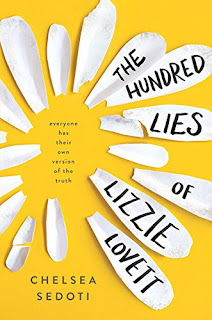Sedoti, Chelsea. The Hundred Lies of Lizzie Lovett. Sourcebooks, 2017.
image from: amazon.com
Summary (from amazon.com)
Hawthorn wasn't trying to insert herself into a missing person's investigation. Or maybe she was. But that's only because Lizzie Lovett's disappearance is the one fascinating mystery their sleepy town has ever had. Bad things don't happen to popular girls like Lizzie Lovett, and Hawthorn is convinced she'll turn up at any moment-which means the time for speculation is now.
So Hawthorn comes up with her own theory for Lizzie's disappearance. A theory way too absurd to take seriously...at first. The more Hawthorn talks, the more she believes. And what better way to collect evidence than to immerse herself in Lizzie's life? Like getting a job at the diner where Lizzie worked and hanging out with Lizzie's boyfriend. After all, it's not as if he killed her-or did he?
Told with a unique voice that is both hilarious and heart-wrenching, Hawthorn's quest for proof may uncover the greatest truth is within herself.
My Thoughts
This book was the Overdrive Big Library Read this season. I felt like I needed to read it if I was going to promote it. (I enjoyed last year's pick https://rhttps://readingjourneys.blogspot.com/2016/10/this-is-where-it-ends.html ). However, this book didn't captivate me like last year's. In fact, it was slow getting into it and took me almost the entire month to read it. I thought it would be more mystery. I thought there'd be more, I don't know. Something. I thought the cover was cute and somehow tied into the book. I thought I'd learn about the hundred lies. I don't think what I expected is what I got.
I also hated the grammatical errors (commas before the word because, not capitalizing words that should be). I understand that modern writers take liberties with conventional rules, but I want teen readers to see correctly written texts as models.
I have this labeled for my mystery/drama genre, but I think I will move this into my chick lit section.
Griffin Mills is a small town with not much to offer. When a girl goes missing in the woods, the entire town starts talking. This isn't just any girl, though. She's Lizzie Lovett. She's was a high school cheerleader, a girl who had lots of friends, a girl who seemingly had "it all" in life. Why would she go missing? What happened? That's what Hawthorn, the main character, is trying to figure out. She speculates some funny scenarios (i.e., alien abduction). She is socially awkward, but on this quest to find out what happened to Lizzie, Hawthorn has self-discovery. She grows. She makes bad decisions. She makes good decisions. She develops some authentic friendships. The title makes the reader think this will be Lizzie's story, but really it's Hawthorn's. I liked Hawthorn. She is real. She is quirky. She is smart!
While reading, I kept thinking that Hawthorn's brother Rush might be "in" on something with Lizzie's disappearance. He just pops in and out of the story. Towards the end, I was glad to see his protective big brother role shine.
I liked seeing the literary references (In Cold Blood, Carrie, and one of my favorite poems We Wear the Mask (https://www.poetryfoundation.org/poems/44203/we-wear-the-mask) including Halloween costumes (Poe and Hester Prynne).
The hippies descending on the family's lawn was funny (and ended up being purposeful to Hawthorn's quest).
It isn't unbelievable that two characters in this book have sex, but the scene is more graphic than it needs to be. This could have been alluded to without the details.
SPOILER ALERT---ultimately, this is a book about a teen suicide. I think the reader needs a resolution about what happened to Lizzie, but as my school and town have experienced this tragedy fairly recently, I wondered about my high school kids reading this book. Lizzie's suicide probably wouldn't haunt me as it does if I wasn't thinking about our local teen. There are similarities in that both situations involve popular kids that seemingly "have it all." This story is a reminder to me that no matter how someone appears on the outside, it may conflict with what's happening on the inside.
The very last chapter gives a summation to the story. I think the reader needs this.
So, overall, the book was too long for me compared to the character development and action of the story. It wasn't as much of a mystery read as it was a relationship story. It probably won't be a book I recommend to my teens.

